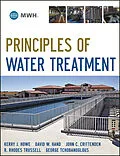Principles of Water Treatment has been developed from the best selling reference work Water Treatment, 3rd edition by the same author team. It maintains the same quality writing, illustrations, and worked examples as the larger book, but in a smaller format which focuses on the treatment processes and not on the design of the facilities.
Autorentext
KERRY J. HOWE is an Associate Professor of Civil Engineering at the University of New Mexico and former principal engineer at MWH. His teaching and research focuses on water quality, membrane processes, desalination, and advanced water treatment technologies. DAVID W. HAND is a Professor of Civil and Environmental Engineering at Michigan Technological University. He has authored or coauthored over 130 technical publications including six textbooks, two patents, and eight copyrighted software programs. JOHN C. CRITTENDEN is Director of the Brook Byers Institute for Sustainable Systems as well as Hightower Chair and Georgia Research Alliance Eminent Scholar in the School of Civil and Environmental Engineering at Georgia Institute of Technology. R. RHODES TRUSSELL is the founder of Trussell Technologies and former senior vice president at MWH. He has served as Chair of the Water Science and Technology Board for the National Academies and, in 2010, was awarded the prestigious A. P. Black Research Award from the American Water Works Association. GEORGE TCHOBANOGLOUS is Professor Emeritus of Civil and Environmental Engineering at the University of California, Davis. He is the author or coauthor of more than 500 technical papers and a number of textbooks, including Wastewater Engineering: Treatment and Reuse and Water Reuse: Issues, Technologies, and Applications.
Klappentext
BY A BESTSELLING AUTHOR TEAM—THE MUST-HAVE REFERENCE ON WATER TREATMENT PRINCIPLES FOR STUDENTS
From the same distinguished author team that brought you the bestselling reference Water Treatment comes this new offering for students wishing to gain a solid understanding of the latest developments in water treatment processes. It maintains the same quality writing, illustrations, and worked examples as the author team's larger Water Treatment but does so in a more digestible and specifically focused format. It covers conventional processes like coagulation, flocculation, sedimentation, and filtration—but unlike any other water treatment book of this size, it gives equal coverage to advanced technologies like adsorption, ion exchange, reverse osmosis, and advanced oxidation.
Complete with example problems, chapter summaries, end-of-chapter review questions, and access to a solutions manual online, Principles of Water Treatment provides all of the tools necessary for a civil or environmental engineering or water resources student to launch a successful and rewarding career.
MWH is a global consulting firm with more than 7,000 professionals and 180 offices in thirty-five countries that provides services to a full range of water-related projects and programs ranging from water supply, treatment and storage, dams, water management for the natural resources industry, and coastal restoration to renewable power and environmental services.
Inhalt
Preface xv
Acknowledgments xvii
1 Introduction 1
1-1 The Importance of Principles 2
1-2 The Importance of Sustainability 4
References 4
2 Water Quality and Public Health 5
2-1 Relationship between Water Quality and Public Health 5
2-2 Source Waters for Municipal Drinking Water Systems 9
2-3 Regulations of Water Treatment in the United States 17
2-4 Evolving Trends and Challenges in Drinking Water Treatment 21
2-5 Summary and Study Guide 23
References 24
3 Process Selection 25
3-1 Process Selection Based on Contaminant Properties 26
3-2 Other Considerations in Process Selection 30
3-3 Sustainability and Energy Considerations 34
3-4 Design and Selection of Process Trains 39
3-5 Summary and Study Guide 42
Homework Problems 43
References 45
4 Fundamental Principles of Environmental Engineering 47
4-1 Units of Expression for Chemical Concentrations 48
4-2 Chemical Equilibrium 51
4-3 Chemical Kinetics 60
4-4 Reactions Used in Water Treatment 63
4-5 Mass Balance Analysis 66
4-6 Introduction to Reactors and Reactor Analysis 73
4-7 Reactions in Batch Reactors 77
4-8 Hydraulic Characteristics of Ideal Flow Reactors 80
4-9 Reactions in Ideal Flow Reactors 84
4-10 Measuring the Hydraulic Characteristics of Flow Reactors with Tracer Tests 88
4-11 Describing the Hydraulic Performance of Real Flow Reactors 95
4-12 Reactions in Real Flow Reactors 101
4-13 Introduction to Mass Transfer 103
4-14 Molecular Diffusion 104
4-15 Diffusion Coefficients 106
4-16 Models and Correlations for Mass Transfer at an Interface 115
4-17 Evaluating the Concentration Gradient with Operating Diagrams 126
4-18 Summary and Study Guide 131
Homework Problems 133
References 138
5 Coagulation and Flocculation 139
5-1 Role of Coagulation and Flocculation in Water Treatment 140
5-2 Stability of Particles in Water 142
5-3 Principles of Coagulation 149
5-4 Coagulation Practice 150
5-5 Principles of Mixing for Coagulation and Flocculation 162
5-6 Rapid-Mix Practice 163
5-7 Principles of Flocculation 165
5-8 Flocculation Practice 170
5-9 Energy and Sustainability Considerations 186
5-10 Summary and Study Guide 187
Homework Problems 188
References 190
6 Sedimentation 193
6-1 Principles of Discrete (Type I) Particle Settling 196
6-2 Discrete Settling in Ideal Rectangulor Sedimentation Basins 201
6-3 Principles of Flocculant (Type II) Particle Settling 205
6-4 Principles of Hindered (Type III) Settling 206
6-5 Conventional Sedimentation Basin Design 211
6-6 Alternative Sedimentation Processes 220
6-7 Physical Factors Affecting Sedimentation 228
6-8 Energy and Sustainability Considerations 230
6-9 Summary and Study Guide 231
Homework Problems 232
References 234
7 Rapid Granular Filtration 235
7-1 Physical Description of a Rapid Granular Filter 236
7-2 Process Description of Rapid Filtration 242
7-3 Particle Capture in Granular Filtration 246
7-4 Head Loss through a Clean Filter Bed 255
7-5 Modeling of Performance and Optimization 258
7-6 Backwash Hydraulics 266
7-7 Energy and Sustainability Considerations 273
7-8 Summary and Study Guide 274
Homework Problems 275
References 278
8 Membrane Filtration 281
8-1 Classification of Membrane Processes 282
8-2 Comparison to Rapid Granular Filtration 284
8-3 Principal Features of Membrane Filtration Equipment 286
8-4 Process Descri...
